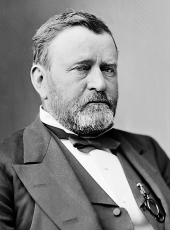To the House of Representatives:
I return to the House of Representatives, in which they originated two joint resolutions, the one entitled "Joint resolution relating to congratulations from the Argentine Republic," the other entitled "Joint resolution in reference to congratulations from the Republic of Pretoria, South Africa."
The former of these resolutions purports to direct the Secretary of State to acknowledge a dispatch of congratulation from the Argentine Republic and the high appreciation of Congress of the compliment thus conveyed. The other directs the Secretary of State to communicate to the Republic of Pretoria the high appreciation of Congress of the complimentary terms in which said Republic has referred to the first centennial of our national independence.
Sympathizing, as I do, in the spirit of courtesy and friendly recognition which has prompted the passage of these resolutions, I can not escape the conviction that their adoption has inadvertently involved the exercise of a power which infringes upon the constitutional rights of the Executive.
The usage of governments generally confines their correspondence and Interchange of opinion and of sentiments of congratulation, as well as of discussion, to one certain established agency. To allow correspondence or interchange between states to be conducted by or with more than one such agency would necessarily lead to confusion, and possibly to contradictory presentation of views and to international complications.
The Constitution of the United States, following the established usage of nations, has indicated the President as the agent to represent the national sovereignty in its intercourse with foreign powers and to receive all official communications from them. It gives him the power, by and with the advice and consent of the Senate, to make treaties and to appoint embassadors and other public ministers; it intrusts to him solely "to receive embassadors and other public ministers," thus vesting in him the origination of negotiations and the reception and conduct of all correspondence with foreign states, making him, in the language of one of the most eminent writers on constitutional law, "the constitutional organ of communication with foreign states."
No copy of the addresses which it is proposed to acknowledge is furnished. I have no knowledge of their tone, language, or purport. From the tenor of the two joint resolutions it is to be inferred that these communications are probably purely congratulatory. Friendly and kindly intentioned as they may be, the presentation by a foreign state of any communication to a branch of the Government not contemplated by the Constitution for the reception of communications from foreign states might, if allowed to pass without notice, become a precedent for the address by foreigners or by foreign states of communications of a different nature and with wicked designs.
If Congress can direct the correspondence of the Secretary of State with foreign governments, a case very different from that now under consideration might arise, when that officer might be directed to present to the same foreign government entirely different and antagonistic views or statements.
By the act of Congress establishing what is now the Department of State, then known as the Department of Foreign Affairs, the Secretary is to "perform and execute such duties as shall from time to time be enjoined on or intrusted to him by the President of the United States, agreeably to the Constitution, relative to correspondence, commissions, or instructions to or with public ministers or consuls from the United States, or to negotiations with public ministers from foreign states or princes, or to memorials or other applications from foreign public ministers or other foreigners, or to such other matters respecting foreign affairs as the President of the United States shall assign to the said Department; and furthermore, the said principal officer (the Secretary of State) shall conduct the business of the said Department in such manner as the President of the United States shall from time to time order or instruct."
This law, which remains substantially unchanged, confirms the view that the whole correspondence of the Government with and from foreign states is intrusted to the President; that the Secretary of State conducts such correspondence exclusively under the orders and instructions of the President, and that no communication or correspondence from foreigners or from a foreign state can properly be addressed to any branch or Department of the Government except that to which such correspondence has been committed by the Constitution and the laws.
I therefore feel it my duty to return the joint resolutions without my approval to the House of Representatives, in which they originated.
In addition to the reasons already stated for withholding my constitutional approval from these resolutions is the fact that no information is furnished as to the terms or purport of the communications to which acknowledgments are desired; no copy of the communications accompanies the resolutions, nor is the name even of the officer or of the body to whom an acknowledgment could be addressed given; it is not known whether these congratulatory addresses proceed from the head of the state or from legislative bodies; and as regards the resolution relating to the Republic of Pretoria, I can not learn that any state or government of that name exists.
U.S. GRANT.
Ulysses S. Grant, Veto Message Online by Gerhard Peters and John T. Woolley, The American Presidency Project https://www.presidency.ucsb.edu/node/203803

